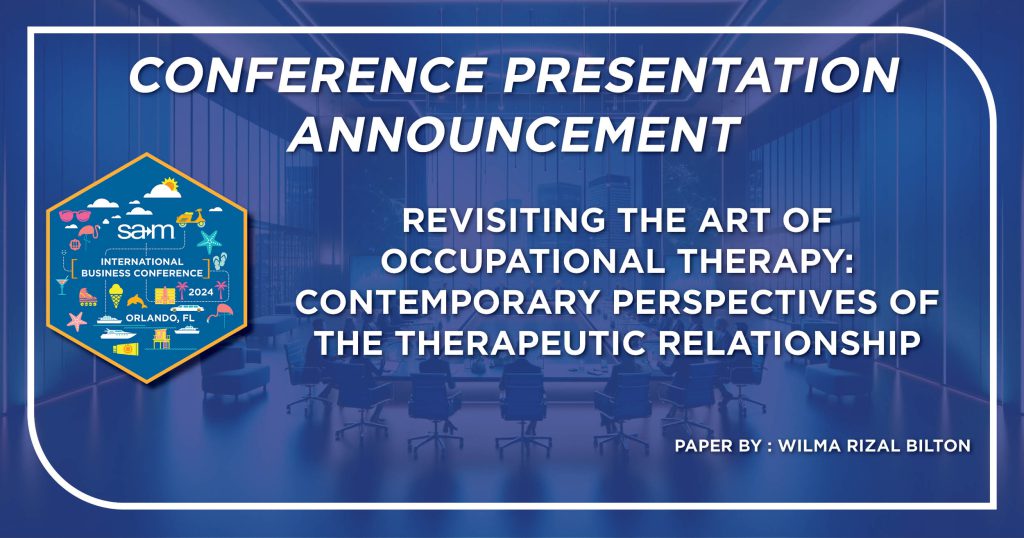
The programming committee for the 79th Annual SAM International Business Conference is pleased to announce the acceptance of the presentation, Revisiting the Art of Occupational Therapy: Contemporary Perspectives of the Therapeutic Relationship by Wilma Rizal Bilton.
We are thrilled to announce a groundbreaking study recently presented at the SAM International Business Conference, which promises to reshape our understanding of the therapeutic relationship within the field of occupational therapy. This comprehensive paper, driven by a phenomenological approach, delves deep into the lived experiences of occupational therapists, shedding light on how these professionals perceive and cultivate the therapeutic relationships that are pivotal to their practice.
The research embarked on an insightful journey with 20 occupational therapists, leveraging both focus groups and individual semi-structured interviews conducted via Zoom. This methodical approach allowed for an in-depth exploration of the therapists’ perspectives, uncovering the nuanced ways in which they integrate essential components of the therapeutic relationship into their work. The findings reveal a rich tapestry of skills and understandings that therapists weave into their interactions with clients, emphasizing the significance of establishing trust, rapport, client empowerment, effective communication, and client-centered care. These elements stand out as foundational pillars, guiding therapists in fostering meaningful connections with their clients.
Interestingly, the study also casts a revealing light on the origins of the knowledge and skills that therapists rely on to build these relationships. It underscores a diverse array of sources, from on-the-job experiences to innate personality traits, educational programs, fieldwork, and personal life experiences. This nuanced understanding challenges us to reconsider how occupational therapists are prepared for their roles, pointing to the vital influence of practical experience over traditional education and fieldwork in shaping their abilities to connect with clients effectively.
Moreover, the research engages in a critical dialogue with existing occupational therapy literature, noting a divergence in emphasis and language. While the concept of the “therapeutic use of self” is prevalent in academic circles, it was not directly mentioned by the study participants. Instead, they articulated the essence of this concept through their descriptions of the therapeutic relationship, suggesting a more intuitive and integrated understanding of these practices among working therapists.
The implications of these findings are profound, signaling the need for a reevaluation of the occupational therapy curriculum, fieldwork performance criteria, and the oversight of entry-level therapists. The study advocates for an educational framework that better aligns with the realities of practice, emphasizing the importance of hands-on experience and the development of personal qualities that support effective therapeutic relationships.
Presented at the SAM International Business Conference, this study not only highlights the critical components of the therapeutic relationship in occupational therapy but also calls for a transformative approach to therapist education and training. It invites us to reflect on how we prepare therapists to make meaningful connections with their clients, ensuring they are equipped with the knowledge, skills, and empathy required to thrive in their invaluable work.
Join us online or in person at SAMIBC 2024 and see this great presentation and many more March 19 – March 23, 2024. For registration information visit www.samnational.org/conference.
